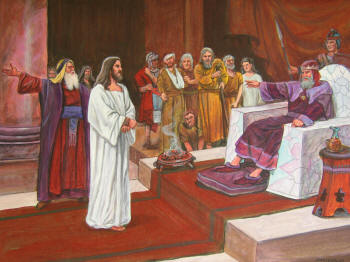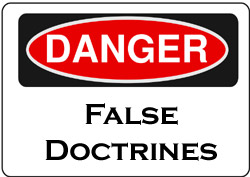“Then Herod and his soldiers began mocking and ridiculing Jesus. Finally, they put a royal robe on him and sent him back to Pilate”—Luke 23:11 NLT
Pilate could not find anything wrong with Jesus, and hoped to evade responsibility for Jesus by shifting him over to Herod, who happened to be in town for the major festival of Passover. But to Herod Jesus is only a curiosity (Luke 23:8,9), and a joke (Luke 23:11). His curiosity, however, goes unrewarded. Since Jesus refused to answer Herod’s many questions, Herod gets tired of it after awhile, and sends Jesus back to Pilate. But before he does, they put a robe on Jesus to crown their mockery of him. The robe and its color are difficult to describe, at least in English. This is only a minor detail, of course, but notice how many different ways and colors this robe is described in various Bible translations at Luke 23:11:
brilliant—HCSB
elegant—NIV; NRSV
rich—NJB
royal—NLT
splendid—ESV
gorgeous—KJV; NKJV
“brightly shining”– NASB
fine—GNB; Berean Study Bible
bright—CSB
colorful—GWT
white—Douay
luxurious—WEB
resplendent garb—NAB
kingly–NCV
This is a good example of one of the many advantages a person who uses multiple translations has, over using only one translation. While this is a very minor point, we can see that there are various ways to translate from the ancient Koine’ Greek into modern English, and also various ways describe something, which can help us to get a better mental picture of what the Bible is describing. After all, vivid mental pictures help us to remember things better. Knowing and remembering what the Bible says is vital to knowing God and Jesus. Knowing them, the Bible says, results in eternal life (John 17:3). Also, very important to Christians who want to fully ‘imitate God, Jesus and Paul’ (Ephesians 5:1; 1 Corinthians 11:1), vivid mental images of things in the Bible better equip us to effectively witness and teach the Word of God to others (Acts 1:8; Matthew 28:19,20; 2 Timothy 3:16,17).
Gospel writer Luke tells his readers:
“Just as they were handed down to us by those who from the first were eyewitnesses and servants of the word. With this in mind, since I have carefully investigated everything from the beginning, I too decided to write down an orderly account“—Luke 1:2,3 NIV
Luke’s
‘careful investigation’ read more





